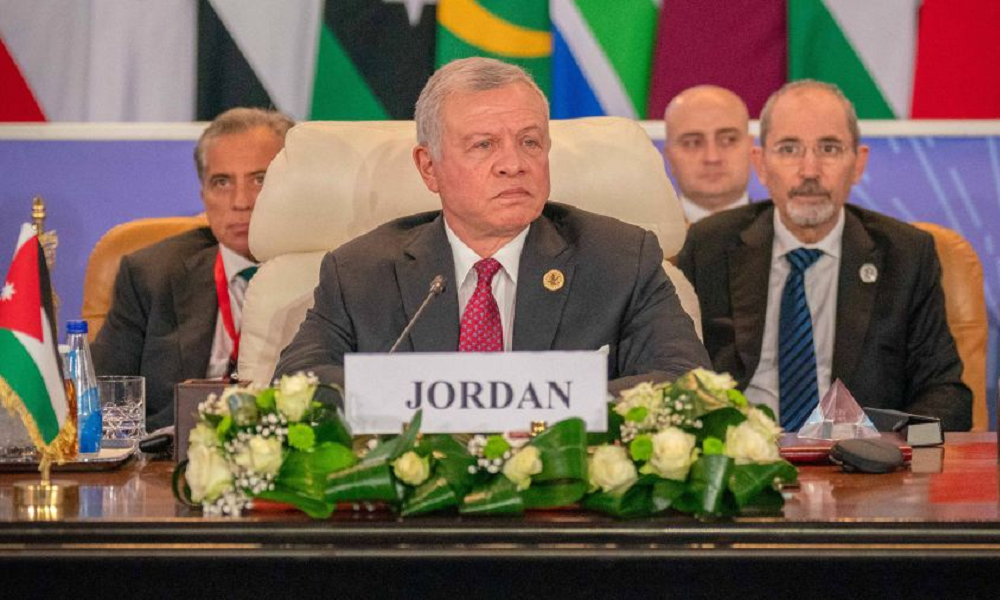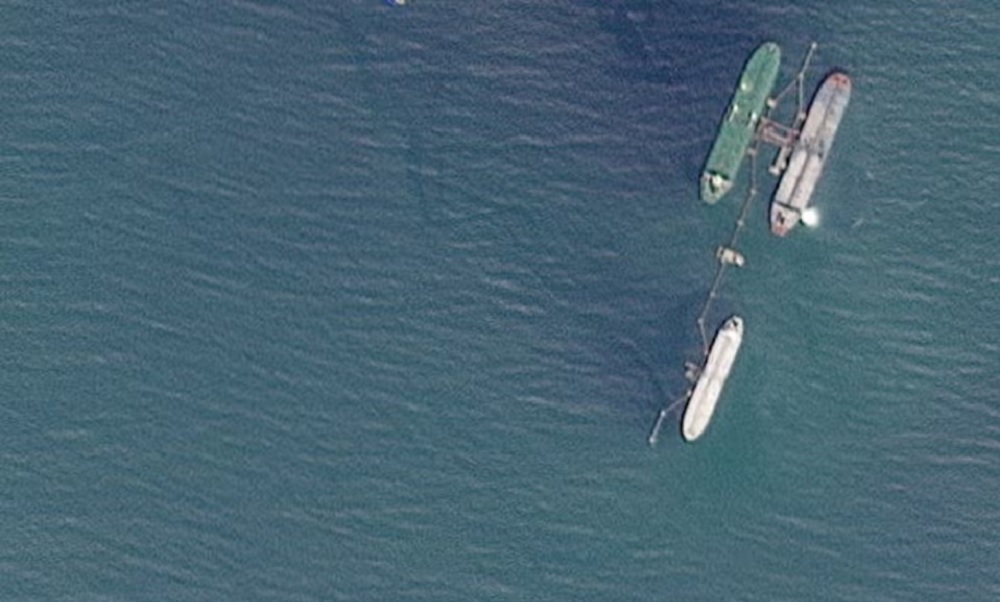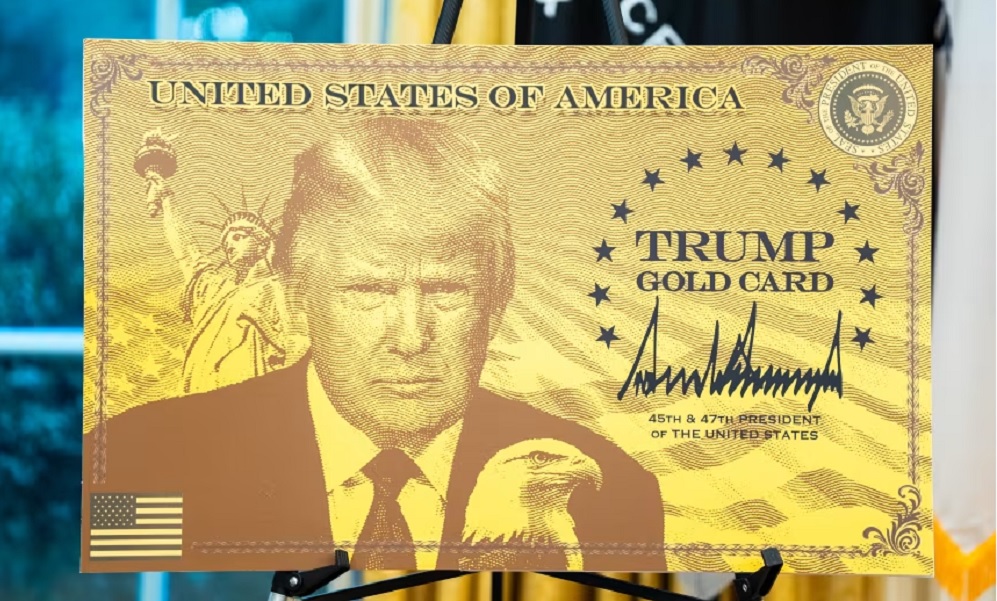World
Jordan’s King condemns global silence on Israel’s ‘war crimes’ in Gaza

Jordan’s King Abdullah this weekend denounced what he termed global silence about Israel’s attacks on Gaza, which have killed thousands of people in the enclave, and left over a million people homeless.
Speaking at a hastily convened meeting dubbed the Cairo Peace Summit, King Abdullah said: “The message the Arab world is hearing is that Palestinian lives matter less than Israeli ones.”
He told Arab leaders present he was outraged and grieved by acts of violence waged against innocent civilians in Gaza, the Israeli-occupied West Bank, and Israel.
“The Israeli leadership must realize once and for all that a state can never thrive if it is built on a foundation of injustice… Our message to the Israelis should be that we want a future of peace and security for you and the Palestinians.”
King Abdullah said that the forced or internal displacement of Palestinians would be a war crime.
Palestinian President Mahmoud Abbas, who also attended the summit, said Palestinians would not be displaced or driven off their land.
“We won’t leave, we won’t leave,” he told the summit.
Egypt, which called the meeting and hosted it, said it had hoped participants would call for peace and resume efforts to resolve the decades-long Palestinian quest for statehood.
But the meeting ended without leaders and foreign ministers agreeing on a joint statement.
This comes two weeks into a conflict that has killed thousands and had a catastrophic impact on the humanitarian situation in Gaza, which is home to 2.3 million people.
Diplomats attending the Cairo talks had not been optimistic of a breakthrough, especially as Israel was not present.
In addition, Israel continues to prepare for a ground invasion of Gaza aimed at wiping out Hamas that rampaged through its towns on October 7, killing 1,400 people.
The Cairo meeting however was meant to explore how to head off a wider regional war but diplomats knew public agreement would be hard because of sensitivities around calls for a ceasefire.
Arab states fear the offensive could drive Gaza residents permanently from their homes and even into neighboring countries – as happened when Palestinians fled or were forced from their homes in the 1948 war following Israel’s creation.
Egyptian President Abdel Fattah al-Sisi said his country opposed what he called the displacement of Palestinians into Egypt’s largely desert Sinai region, adding the only solution was an independent Palestinian state.
Egypt fears insecurity near the border with Gaza in northeastern Sinai, where it faced an insurgency that peaked after 2013 and has now largely been suppressed.
Jordan, home to many Palestinian refugees and their descendants, fears a wider conflagration would give Israel the chance to expel Palestinians en masse from the West Bank.
Saudi Crown Prince calls for establishment of ‘1967 borders’
As concerns grow in the region over Israel’s actions, Saudi Crown Prince Mohammed bin Salman also spoke out his past week about the conflict and rejected the targeting of civilians under any pretext.
Prince Mohammed said during his opening speech at the GCC-ASEAN summit in Riyadh on Friday that there is a need to create conditions that lead to the establishment of a “Palestinian state within the 1967 borders.”
“As we are holding this meeting, we are pained by the escalation of the ongoing violence in Gaza, the price of which is being paid by innocent civilians,” he said.
“In this regard we affirm our rejection of targeting civilians in any way, and the importance of sticking to the international law and the necessity of stopping military operations against civilians and infrastructure that affect their daily lives and creating conditions to restore stability and achieve peace that ensures reaching a solution to establish a Palestinian state according to the pre-1967 borders in a way that achieves security and prosperity for all.
The 1967 borders refer to those that existed before the war in which Israel occupied East Jerusalem, the West Bank and the Gaza Strip. It includes a two-state solution that has long been proposed as the best hope for peace in the Palestine-Israel conflict.
It would see an independent Palestinian state established alongside the existing one of Israel – giving both people their own territory.
This conflict however has deep roots and the creation of Israel and subsequent Arab-Israeli war of 1948 saw many Palestinians forced from their homes, in what is known as the Nakba, or “catastrophe”.
Humanitarian aid
On Sunday, a second convoy of aid trucks entered the Egyptian side of the Rafah border crossing heading towards Gaza, Reuters cited Egyptian security and humanitarian sources at Rafah as saying.
A total of around 19 trucks carrying medical and food supplies had been inspected by UNRWA, the UN’s Palestinian refugee agency, the sources said.
The first convoy of 20 trucks of badly needed supplies entered Gaza on Saturday.
This comes after Israel imposed a total blockade and launched air strikes on Gaza in response to the October 7 attack by Hamas. The Rafah crossing had been out of operation since shortly afterwards, and bombardments on the Gaza side had damaged roads and buildings.
UN officials said however a higher continuous pace of at least 100 trucks a day would be required in Gaza to cover urgent needs. Before the outbreak of the most recent conflict, several hundred trucks had been arriving in the enclave daily.
UN humanitarian chief Martin Griffiths told Reuters on Saturday that work was underway to develop a “light” inspection system, whereby Israel could check the shipments but ensure a sustained flow.
World
Venezuela-US tensions spike in wake of seized tanker as Nobel winner vows change

Venezuelan opposition leader Maria Corina Machado on Friday promised political change after slipping out of the country in secret to collect the Nobel Peace Prize, as the shock waves intensified from the Trump administration’s seizure of an oil tanker earlier this week.
That escalation came on the heels of a large-scale U.S. military buildup in the southern Caribbean as President Donald Trump campaigns to oust Venezuelan leader Nicolas Maduro, pushing relations to their most volatile point in years, Reuters reported.
The effects could ripple through the region, with Venezuelan oil exports falling sharply and crisis-stricken Cuba, already straining to power its grid, at risk of losing supply.
The U.S. seizure of the Skipper tanker off Venezuela’s coast on Wednesday marked the first U.S. capture of Venezuelan oil cargo since sanctions were imposed in 2019.
The vessel is now heading to Houston, where it will offload its cargo onto smaller ships, Reuters reported.
The Trump administration does not recognize Maduro, in power since 2013, as Venezuela’s legitimate leader.
Washington has signalled more seizures are planned as part of efforts to choke off sanctioned oil flows, and subsequently imposed new sanctions on three nephews of Maduro’s wife and six tankers linked to them.
The U.S. military presence in the Caribbean has grown as Trump in recent weeks has discussed potential military intervention in Venezuela, based on accusations that the country ships narcotics to the United States. The Venezuelan government has denied the accusations.
So far there have been over 20 U.S. military strikes in the Caribbean and Pacific against suspected drug vessels this year, in which nearly 90 people have been killed, alarming human rights advocates and stirring debate among U.S. lawmakers.
While many Republicans have backed the campaign, Democrats have questioned whether the campaign is illegal and urged more transparency, including the release of a full, unedited video, opens new tab of strikes on a suspected drug-trafficking boat.
MACHADO DEFIES BAN, URGES TRANSITION
Machado defied a decade-long travel ban and a period in hiding to travel to Oslo on Thursday, noting that she would soon bring the Nobel Peace Prize back home to Venezuela.
She said Maduro would leave power “whether there is a negotiated changeover or not,” vowed she is focused on a peaceful transition, and thanked Trump for his “decisive support.”
Machado is aligned with U.S. hardliners who accuse Maduro of ties to criminal networks – claims that U.S. intelligence has reportedly questioned.
When asked at a press conference in Oslo if she believed U.S. intervention was needed in Venezuela, Machado replied, “We are asking the world to help us.”
Venezuela condemned the tanker seizure as “blatant theft” and “international piracy,” saying it would file complaints with international bodies.
At the same time, Venezuelan lawmakers took a step to withdraw the country from the International Criminal Court, which is currently investigating alleged human rights abuses in the South American country.
Adding to the friction, the Venezuelan government announced the suspension of a U.S. migrant repatriation flight on Friday. A U.S. official countered that deportation flights would continue.
World
Putin arrives in Ashgabat to hold series of meetings

Russian President Vladimir Putin has arrived in Turkmenistan’s capital for a two-day visit.
According to TASS, the presidential aircraft of the Rossiya Special Flight Detachment landed near the presidential terminal of Ashgabat International Airport, commonly referred to as the “small bird” for its distinctive design.
During his visit, Putin will attend an international forum titled “Peace and Trust: Unity of Goals for a Sustainable Future” and hold several bilateral meetings.
The Kremlin has confirmed talks with Turkish President Recep Tayyip Erdogan, while the Iranian Embassy has announced that a meeting with President Masoud Pezeshkian is also planned.
The Ashgabat forum will also be attended by Turkmen President Serdar Berdymukhamedov, along with the presidents of Armenia, Iraq, Kazakhstan, Kyrgyzstan, Uzbekistan and Tajikistan, as well as the prime ministers of Azerbaijan, Hungary, Georgia and Pakistan.
World
Trump launches gold card program for expedited visas with a $1 million price tag

President Donald Trump’s administration officially launched his “Trump Gold Card” visa program on Wednesday to provide a pathway, with a steep price, for non-U.S. citizens to get expedited permission to live in the United States.
The website Trumpcard.gov, complete with an “apply now” button, allows interested applicants to pay a $15,000 fee to the Department of Homeland Security for speedy processing, Reuters reported.
After going through a background check or vetting process, applicants must then make a “contribution” — the website also calls it a “gift” — of $1 million to get the visa, similar to a “Green Card,” which allows them to live and work in the United States.
“Basically it’s a Green Card, but much better. Much more powerful, a much stronger path,” Trump told reporters at the White House. “A path is a big deal. Have to be great people.”
Commerce Secretary Howard Lutnick said some 10,000 people have already signed up for the gold card during a pre-registration period and he expected many more to do so. “I would expect over time that we’d sell, you know, thousands of these cards and raise, you know, billions, billions of dollars,” Lutnick told Reuters in a brief interview.
Lutnick said the gold card program would bring people into the United States who would benefit the economy. He compared that to “average” Green Card holders, whom he said earned less money than average Americans and were more likely to be on or have family members on public assistance. He did not provide evidence for that assertion.
Trump’s administration has pursued a broad crackdown on immigration, deporting hundreds of thousands of people who were in the country illegally and also taking measures to discourage legal immigration.
The gold card program is the Trump version of a counter balance to that, designed to make money for the U.S. Treasury in the same way the president, a former New York businessman and reality television host, has said his tariff program has successfully done.
Lutnick noted that there was also a corporate version of the gold card that allowed companies to get expedited visas for employees they wanted to work in the United States, for a $2 million contribution per employee.
-

 Sport4 days ago
Sport4 days agoILT20: Desert Vipers edge Gulf Giants in historic super over thriller
-

 Latest News2 days ago
Latest News2 days agoMuttaqi: Afghanistan’s progress requires both religious and modern education
-

 Regional4 days ago
Regional4 days agoSix Pakistani soldiers killed in TTP attack in Kurram District
-

 Business4 days ago
Business4 days agoTrade bodies warn almost 11,000 Afghan transit containers stuck at Karachi port
-

 World4 days ago
World4 days agoPowerful 7.6 earthquake hits northern Japan, tsunami warnings issued
-

 Latest News3 days ago
Latest News3 days agoTrump calls Afghanistan a ‘hellhole’ country as US expands immigration restrictions
-

 Sport5 days ago
Sport5 days agoSorkh Poshan Khafi defeats Sarsabz Yashlar 4-0 in Afghanistan Champions League
-

 Sport3 days ago
Sport3 days agoCommanding wins for Arman FC and Sarsabz Yashlar in Afghanistan Champions League
























